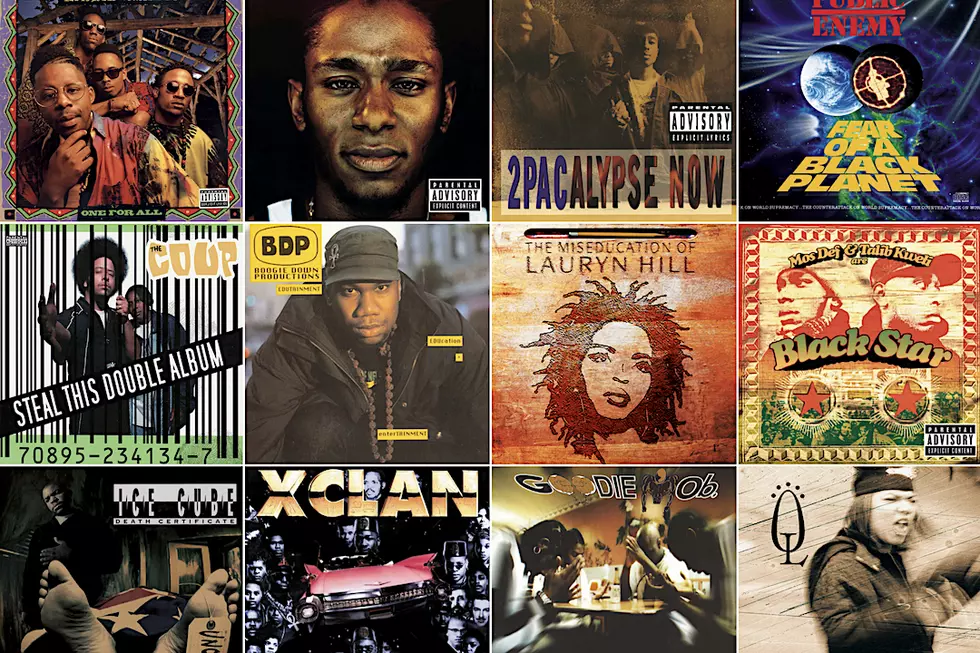
This or That? X Clan vs. Double XX Posse
This week we’re going back to simpler times, when rap groups appeared on television holding staffs and wearing clothes with ankhs on them. We’ll look at two similarly named but divergently minded groups, X Clan and Double XX Posse, to see who stands the test of time. Shout out to X-Mob too.
The year is 1992, and to many hip-hop heads, rap is already hurtling towards decline. It seems ridiculous in retrospect, but only one year later KRS-One would announce the ‘Return of the Boom Bap’ as though it had already left. To millennials, it doesn’t make much sense.
The first wave of hip-hop revolutionaries was receding as the art form flowered. Groups like Fu-Schnickens and Das EFX were shaving fans left and right with their narrow styles while genre-defining acts from the late '80s were experiencing their twilight, if they were even still together. Acts like X Clan.
In 1989, X Clan (Brother J, Professor X, Paradise, and DJ Sugar Shaft, who died of AIDS the same year Eazy-E did) put out their first 12” single on 4th and Broadway Records, ‘Heed The Word Of The Brother / Raise The Flag.’ It had a Garvey side named after the famous Marcus Garvey, who campaigned for blacks to return to Africa. Afrocentrism was X Clan’s message. Rap was just the vehicle.
The ‘Heed The Word…’ video featured footage of police brutality during the civil rights movement and showed the group dressed in African garb. Based in Brooklyn, sampling Zapp, and talking about pyramids? This was what the Blackwatch Movement movement mobilized – a global understanding that Malcolm X, some 30 years earlier, tried to illustrate by connecting the struggle in Harlem with the problems in Africa. The oppression of blacks was a worldwide phenomenon, and hip-hop was shining a light on it.
Together with Isis (later known as Lin Que), Queen Mother Rage, and Unique & Rashan, X Clan fell under the auspices of the Blackwatch Movement, an organization that also promoted Professor X’s solo albums and sought to oppose the increasingly popular trend of gangsta rap. In an old interview with Anti-Thug.com, Brother J seemed to lay out the movement’s goal through music:
“All I want to do is say, ‘Lets build an example of civilization so people can learn from us again.’ If we don't show that then we never prove who we are. If we continue to show the barbaric side or the angry side of who we are then they will always judge us as that.”
It’s interesting to note that the Native Tongues movement was growing at around the same time as the Blackwatch Movement. Both crews seemed to espouse the same purpose – for black people to come together and celebrate themselves, their histories, and their communities, but where De La Soul, Tribe Called Quest, and Black Sheep were about peace and unity, X Clan and Queen Mother Rage voiced their opinions with aggression. Perhaps the split in approaches is what led many to see De La and their affiliates as hippie rap (the daisies probably didn’t help, either). If Native Tongues were lovey dovey integrationists, then those of the Blackwatch Movement were hard-nosed, apolitical separatists.
In 1992, X Clan would release their last important album, ‘Xodus,’ and Double XX Posse would release their debut LP, ‘Put Ya Boots On.’ It symbolized a passing of the torch from disruptive, flagrant pro-black rap to a more subdued, softened sound, perhaps as a sign of the times. Commercialization was seeping in and songs were becoming smoother instead of harder. Hip-hop may have been growing into a global sensation, but at what cost?
Compared to X Clan, Double XX Posse don’t seem to talk about much at all. It’s not that their music wasn’t enjoyable – they talked a lotta clever s--t over funky production – but compared to X Clan, it’s like the Disney Channel versus PBS. You’re tuned in for two different reasons.
‘Put On Ya Boots’ is a thorough album, especially with production help from T-Ray, who would go on to work with Cypress Hill, Artifacts, Kool G Rap, and tons of other artists from various genres. He produced the biggest single from the album, ‘Not Gonna Be Able To Do It,’ which reached #1 on the Billboard Hot Rap Singles chart in 1992. But next to a dense, powerful product like X Clan, Double XX Posse just didn’t have the same energy.
Besides their monikers, the two groups had very little in common. Depending on your mood, each act serves a different purpose, but in a historical sense, X Clan joined the ranks of Public Enemy, Poor Righteous Teachers, and KRS-One as knowledge providers. Double XX Posse just kicked (ass and) dope rhymes.
More From TheBoombox









